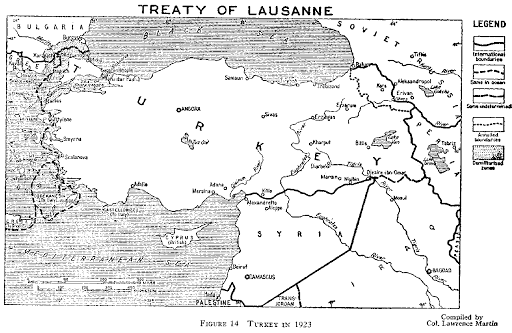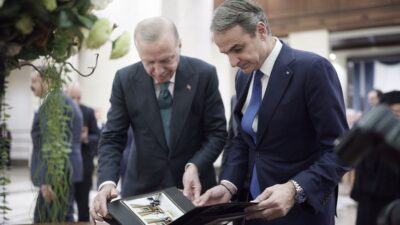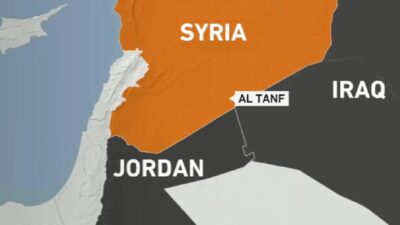Dimitris Chatzidimitriou: How Erdogan’s imperial syndrome is killing the Treaty of Lausanne
20/10/2020
On Thursday, October 15, 2020, Turkish President Recep Tayyip Erdogan, announcing the start of the 2020-2021 academic year, declared: “Some people tell us not to expand. But there is violence … There is violence in Libya. We can not be silent. There is violence in the 911 kilometers of our border. There is violence in Syria. Why be silent? On the other hand, there is violence in Somalia. We can not stop. There is a historical responsibility that our ancestors have placed on us. And we do not stop, and we try to do our duty where we should. “
This is not a “delusion of grandeur”, as some like to support and excuse the Turkish President. It is the way Erdogan chose to announce his ambitions urbi et orbi, as well as the transition of his country’s policy internationally, to another phase. Turkey is now abandoning the period in which it was interested in expanding its influence and moving on to the next step, which is the expansion of sovereignty.
The “militarization” of its foreign policy is a first step, which will be followed, according to the calculations and plans of the ruling elite in Ankara, by the overthrow of Turkey’s contractual commitments and, above all, by the abolition-revision of the Lausanne Peace Treaty. However, Turkey has already dealt a severe blow to the Treaty, without meeting the reaction of the international community, and thus strengthens its efforts for its complete abolition.
The Peace Treaty of Lausanne (July 24, 1923) defined not only the Greek-Turkish border (Article 2, paragraph 2), but also the border with Syria and Iraq (Article 3, paragraphs 1 & 2), for which The Franco-Turkish Agreement of October 20, 1921 (Syria) and the corresponding one, later in Lausanne, with Britain (Iraq).
97 years later
Now, 97 years later, Turkey has invaded Syria, where it occupies part of its territory in the north of the country, “enters and leaves” at will in Iraq, setting up advanced outposts under the guise of fighting terrorism and disputes the sovereignty of islands, islets and rocks in the Aegean, overlooking the explicit wording of Article 12 of the CIS, that only “the islands, which are less than three miles off the coast of Asia, remain under Turkish rule.”
Under Article 15, Turkey “renounces all rights in favor of Italy” over the islands of the Dodecanese “and the islands dependent on them, as well as the island of Kastellorizo”. Greece, as it is known, with the Treaty of Paris (1947) – in which the “elusive neutral”, that is, Turkey, was not a party – succeeded Italy in the domination of the Dodecanese.
Erdogan, who so late remembered the voices and legacies of his ancestors, deliberately forgets Article 17 of Lausanne and the explicit wording: “Turkey’s renunciation of all its rights and titles over Egypt and Sudan is considered to have been done by November 5, 1914 “.
While, with Article 22, “Turkey declares that it recognizes the final abolition of all rights or privileges of any kind, which they ceded to Libya, under the Treaty of Lausanne of October 18, 1912 and the related Acts”. Today, it is constantly working to bring about regime change in Egypt, strengthening the “Muslim Brotherhood” in various ways, and is present militarily in Libya, Sudan, and Somalia.
It is also present in Cyprus, which the sultan had ceded to Britain in 1878, as a colony-protectorate and from which he had resigned, since Article 20 of Lausanne, “recognizing the annexation of Cyprus, was declared by the British Government on the 5th. November 1914 “, while in article 21 he accepted,” the Turks, settled on the island of Cyprus on November 5, 1914, will acquire, according to the conditions provided by the domestic law, the British citizenship, therefore foresaking the Turkish one “.
When did Turkey ever respect its signature?
Turkey, which returned to Cyprus in the 1950s because of British machinations and Athens’ disastrous manipulations, has remained the occupying power of 37% of the island since 1974, mocking international legitimacy and its collective bodies.
Erdogan’s latent interest in the Muslim faith on the perimeter of Turkey runs counter to the provisions of Article 27 of the Lausanne Convention, which states that “No power or jurisdiction in political, legislative or administrative matters shall be exercised outside Turkish territory by the Turkish Government or authorities, for any reason whatsoever, over the nationals of a territory placed under the sovereignty or protectorate of the other Powers signatory of the present Treaty, or over the nationals of a territory detached from Turkey”.
But did Turkey respect its signature and the commitments it made in Lausanne to protect the minorities that remained in its territories? From the day after the signing, it violated Article 14, which provided for and established a regime of extensive self-government in Imvros and Tenedos, Greek islands that remained under its domination, leading their Greek population to emigration.
And there is not one (number 1) of Articles 38 to 44 of Section E of the Treaty on the Protection of Minorities that has not been brutally violated, although, as underlined in Article 37, “TTurkey undertakes that the stipulations contained in Articles 38 to 44 shall be recognised as fundamental laws, and that no law, no regulation, nor official action shall conflict or interfere with these stipulations, nor shall any law, regulation, nor official action prevail over them.”.
The list of transgressions
The list of misery suffered by those unfortunate who remained in Turkey is endless and this is only an indicative list:
- In 1942, at a time when humanity was facing the monster of Nazism-Fascism, the government of Sukros Saratzoglu legislated and President Ismet Inonu ratified the famous Varlik Vergisi, the Special Capital Tax, which financially exterminated the Greeks, Jews, and Armenians, mainly. This law remains an eternal, indelible mark of the Turkish Republic.
- Forced recruitment of men aged 20-45 in the Labor Battalions, the infamous Amele Taburlari, exterminating hundreds of minority citizens.
- The persecution of the Greeks of Constantinople, on 5-7 September 1955, with dozens of dead, the rape of hundreds of Greek women and complete destruction of thousands of Greek expatriate businesses.
- The deportations of Greeks from Constantinople in 1964-1965 and the confiscation of their property, with a secret decree of 1964 which was revealed in the mid-1980s by the late Giannos Kranidiotis with his tireless activity, suggesting to Andreas Papandreou to connect it with Turkey’s European perspective.
- The questioning of the Ecumenical character of the Patriarchate and its legal affiliation to the Prefecture of Constantinople, as a Turkish institution.
- The closure in 1971 of the Holy Theological School of Halki, from which from the foundation in 1844 to 1971 930 students-priests graduated and out of which 343 became hierarchs, 12 were elected Ecumenical Patriarchs, two Patriarchs of Alexandria, two Archbishops, four Patriarchs of Antioch, and an Archbishop of Tirana.
The seminary that was a nursery for Orthodox clergy
An orthodox school for priests and a real cradle of doctrine and theological thought, which remains closed despite the interest shown by almost all American presidents, but also the EU. So when Erdogan in Turkey seeks to persuade Turkish citizens that they are ostracized from the heritage of their ancestors, his audience abrod is amazed at what is evoked by Pax Ottomanica, asenvisioned and planned by the politico-military order in Ankara.
The illusions maintained by some Western political circles will sooner or later be shattered by the realities of a “new Turkey” that is not comfortable with the confessional regime of other times. Erdoganism, as a concept of destined and imposed greatness, emerging from the ashes of another “-ism”, Kemalism, will remain after Erdogan’s disappearance from the political forefront. This is because it “responds” to the quests of a very specific school of thought, a power group that seeks another role for Turkey, in a world of overwhelming fluidity and geopolitical anarchy.





